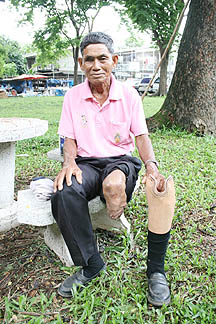 |
|
Chalong Ngamngod
shows his prosthetic leg
|
BANGKOK (UCAN) – The Jesuit Refugee Service (JRS) recently commemorated the 10th anniversary of the Ottawa Mine Ban Treaty and its own more than decade-long campaign to warn Thais of the dangers of mines.
Many Thais have lost legs, arms or their lives through mines left behind by fighting in several border areas of the country.
“The landmines are a silent war. This is an international problem,” said Emilie Ketudat, coordinator of the Thailand Campaign to Ban Landmines of JRS-Asia Pacific.
“Even when the war is over, landmines continue to haunt people for years after,” she told UCA News at the commemorative event held at Xavier Hall, the Jesuits’ center in Bangkok on May 17. About 60 people, including priests and laypeople, attended the event.
It included an exhibition on past and present landmine situations, stories from landmine survivors, a de-mining demonstration, a band performance by people with disabilities, painting activities for children and video shows.
Thailand’s landmine problem is less well known than the problem in neighboring Cambodia where wars have left a deadly legacy of mines that have killed and injured many.
According to Landmine Monitor Report 2008, however, Thailand is also affected by landmines and other unexploded ordnance left over from conflicts on its borders with countries such as Cambodia, Laos and Myanmar.
UCA News spoke with some landmine survivors at the May 17 event. They all said they remember their accidents vividly.
Chalong Ngamngod, 66, stepped on a mine while casting a fishing net in a creek in Sakaeo province, near the Cambodian border.
“I lost my left leg and right eye in 1991,” he said. It took him three years to recover and now he walks with the aid of a prosthetic leg. He was lucky.
“My brother died instantaneously after stepping on a landmine,” he recalled with sadness. “I hope that one day the world and my country will be free of landmines.”
Major Sirichai Sapsiri, 50, the president of the Association of Persons with Physical Disability International, said he stepped on a mine on a battlefield in Surin province in 1992.
“I lost my left leg and left arm and was in hospital for 740 days,” Sirichai said. He now also walks using a prosthetic leg, supporting himself with a cane. “That is always possible in the life of the soldier, either to end up a corpse or disabled,” he said philosophically.
After recovering, he became a lecturer highlighting the situation for survivors and urging more assistance for victims both nationally and internationally. “The landmines remain not just in the land, but also in the heart of victims,” he said.
Boonrat Chanchu, 40, a JRS official, became an active leader in her village in Sakaeo province after she stepped on a landmine while gathering bamboo in the forest in 1996. She lost her left leg but her uncle was killed by the explosion. “Wherever there was fighting, there are landmines,” she said.
She now represents landmine survivors in Thailand and participates in national and international events to obtain assistance for these victims.
“The landmines are a silent killer and are still a threat in many countries. I hope that my country will be free of mines one day,” she added.
Thailand signed the Ottawa Treaty, or Mine Ban Treaty, on Dec. 3, 1997. It came into effect on May 1, 1999. The JRS has continued to spread information about the effect of landmines on ordinary people, to campaign for the banning of their use, and to lobby the government to fulfill its obligations under the Ottawa Treaty.


















